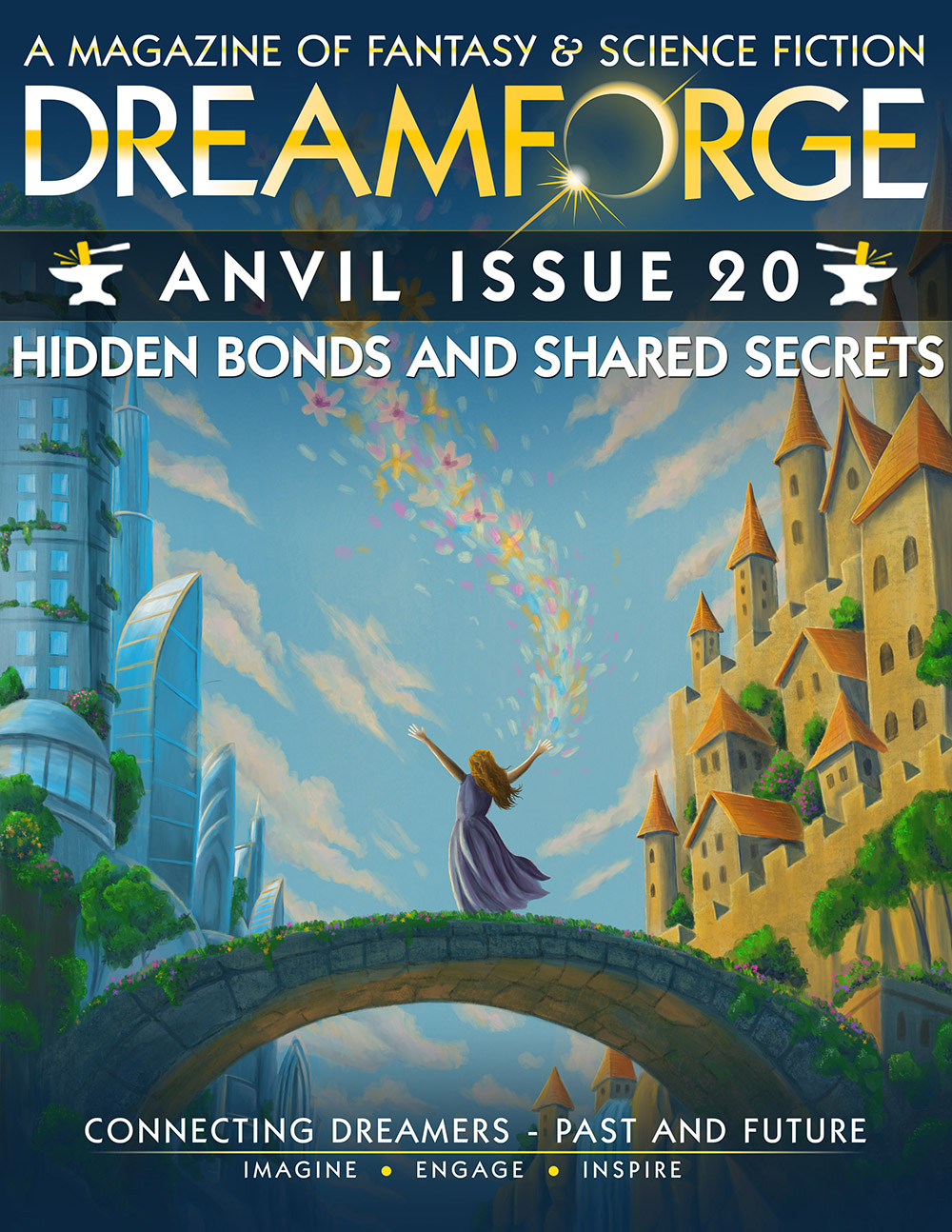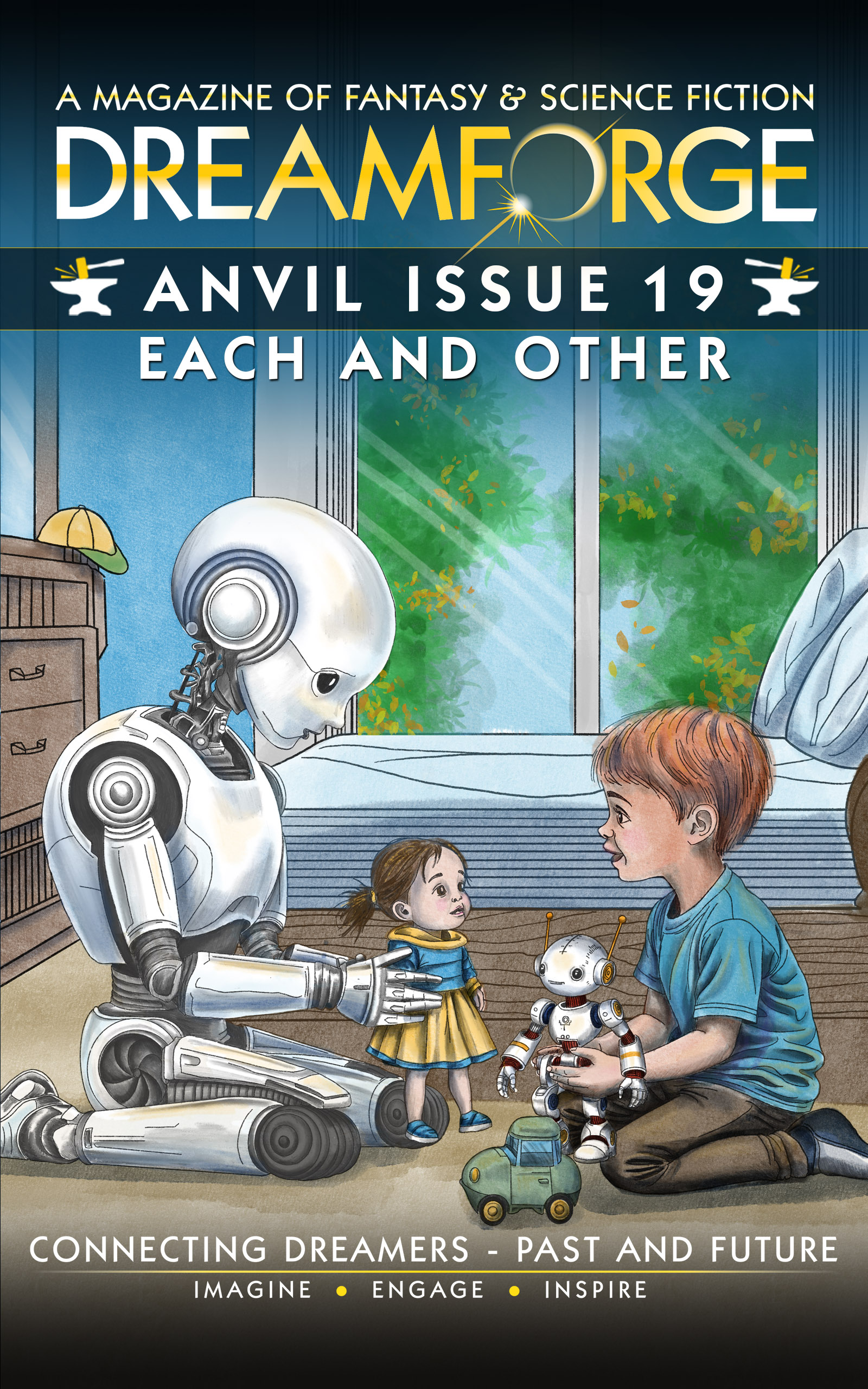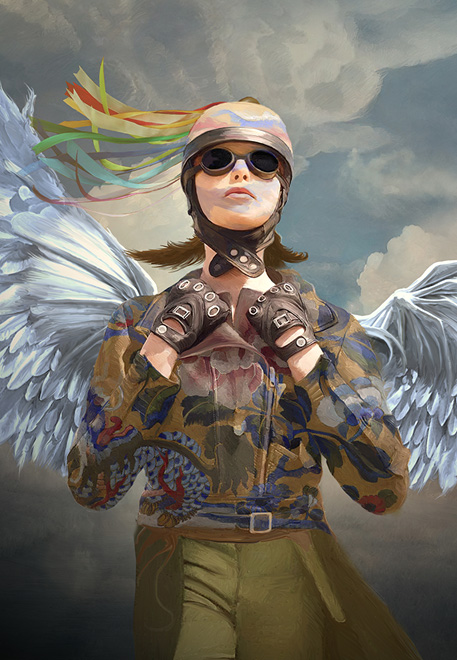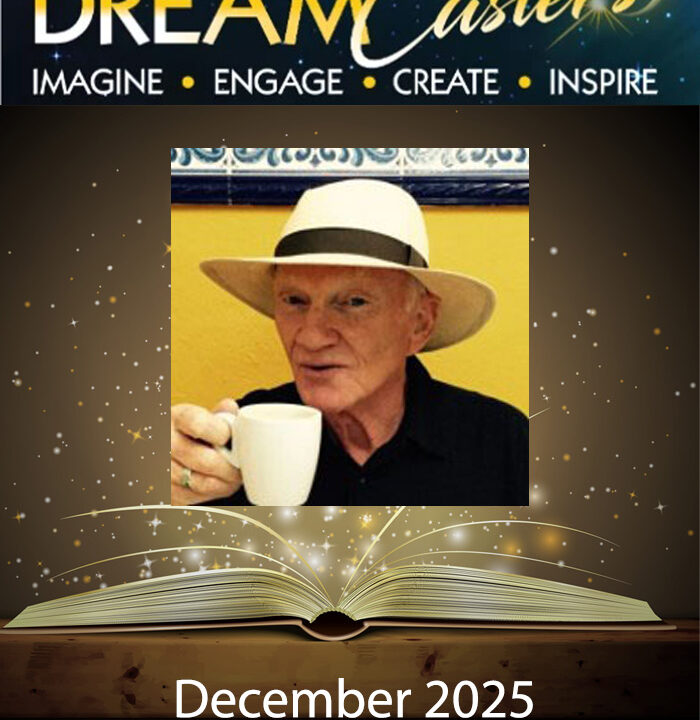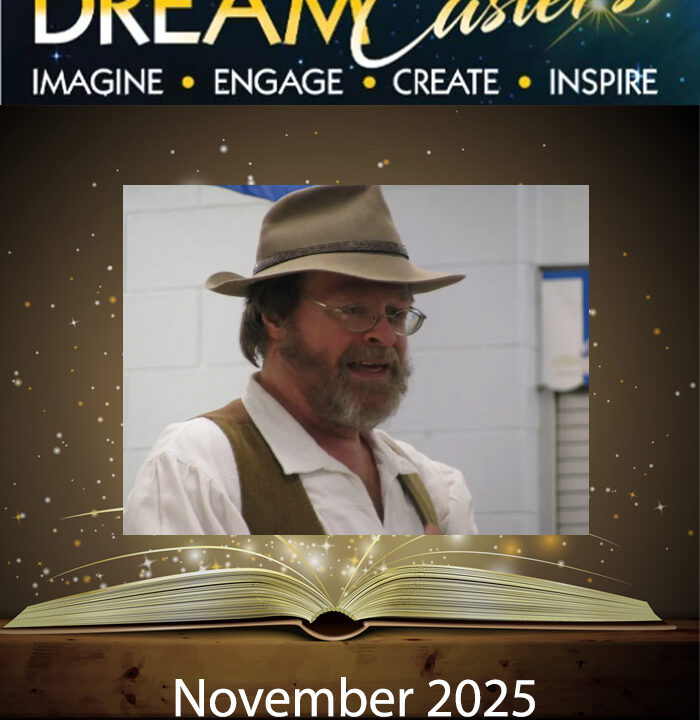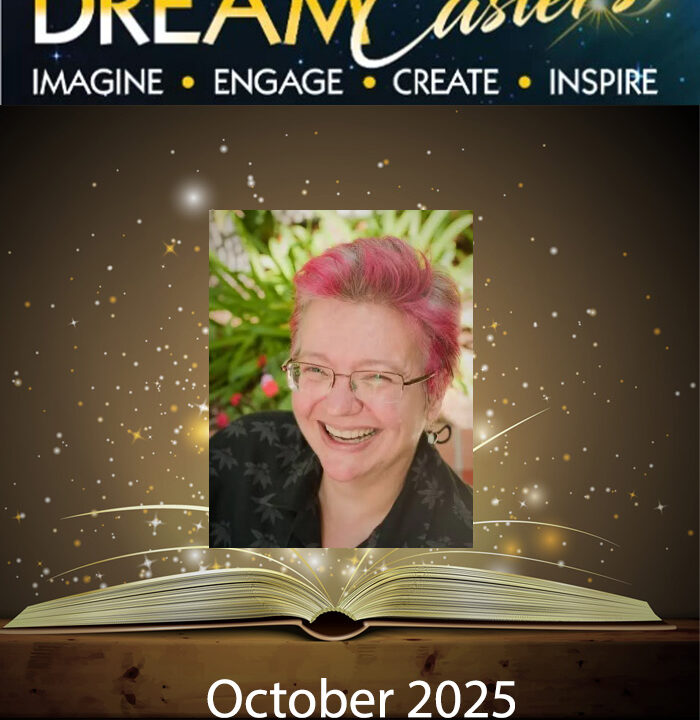DreamCasters Agenda, July 2025
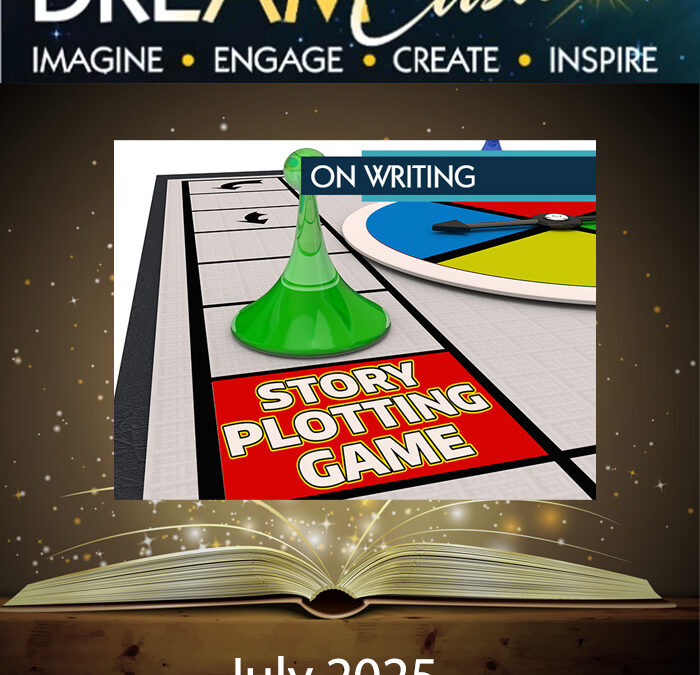
07-12-2025 | 1:00 pm ET via ZOOM
Opening Statement
Welcome to the 50th Session of DreamCasters, a DreamForge discussion group devoted to helping our members improve their writing and storytelling through discussion and sharing expertise.
For this 50th Meeting, guests who want to check a DreamCasters Meeting are welcome for FREE!
DreamForge News
DreamCaster Dates for 2025
Here are the dates and guests for upcoming meetings
- July 12th (Saturday) – We’re going to play the Story Plotting Game, with a concentration on the “Try/Fail Cycle” part of plotting
- August 2nd (Saturday) – Stephen Schwartz of Smalltown Tales. Unlock your writing and storytelling potential with Smalltown Tales, the card game that guides you in crafting captivating narratives. Players collaborate to create fascinating characters, captivating plots, and immersive settings using expert writing and storytelling techniques
- September 14th (Sunday) – Danny Hankner of Story Unlikely stops by to tell us what he’s looking for an clue us in to his 2026 writing contest with $5K in award monies to win.
Member & Author Accomplishments
Congratulations for winners and honorable mentions in Story Unlikely’s annual contest.
Among winning stories, DreamCaster Brittany Rainsdon took both 2nd and 3rd place with her stories “Your Final Moments on Earth” and “Rainbow Baby.”
DreamForge Editor Scot Noel was among 8 Finalists with “Into the Womb of Heaven.”
Other DreamCaster Finalists included Wulf Moon with “Lilith and the Thronguk” and K.Z. Richards with “The Things Lazurus Knew.” Wulf Moon was also a semifinalist with “On Thin Ice.”
Our Program – The Plotting Game
In today’s DreamCaster ZOOM session, we’re going to play The Plotting Game, but with a focus on the Try / Fail Cycle, which is where most writers “try and fail.”
To save time to start, we have two story beginnings built out, and as a group, you can pick the one you want to work with. Then we’ll divide into two different breakout rooms, with each team trying to complete a Try/Fail Cycle in 30 minutes. Then we’ll come back to discuss the results and see who “wins” based on the best set of increasing obstacles for their story.
Space Opera or Urban Fantasy?
Space Opera – “Finders Fee”
Orientation
- Who: Kess, a mid-level cargo pilot for the Meridian Trading Consortium
- What: Running routine maintenance checks on their freighter while docked
- When: During the third shift (night cycle) at a busy spaceport
- Where: Docking Bay 47 on Titan Station, a major trading hub in the outer colonies
- Atmosphere: Mundane, tired, going through the motions of another overnight shift
Character Flaw
Greed/Opportunism: Kess has a habit of taking “finder’s fees” – skimming small amounts of cargo or taking under-the-table jobs. Kess rationalizes it as “everyone does it” and “the Consortium can afford it.” This side-hustle mentality makes them prone to overlooking red flags when credits are involved.
Threshold Event
During the maintenance check, Kess discovers an unregistered cargo pod magnetically attached to the hull of their ship. The pod is small, expertly hidden, and definitely not on any manifest. It’s sealed with military-grade locks and emanating a faint energy signature.
Narrative Hook
Instead of reporting the pod (as regulations require), Kess decides to crack it open, thinking it might contain something valuable they can sell on the side. The moment they break the seal, an emergency beacon activates, and the pod reveals something that is beyond Kess’s skill set to handle.
Urban Fantasy – “After Hours”
Orientation
- Who: Morgan, a night-shift barista at “The Blessed Bean” coffee shop
- What: Closing up alone after a slow Tuesday night
- When: 11:47 PM on a rainy October evening
- Where: A quirky independent coffee shop in the arts district of a modern city
- Atmosphere: Quiet, routine, the familiar comfort of closing rituals (counting till, wiping counters, turning off machines)
Character Flaw
Chronic People-Pleaser/Cannot Say No: Morgan has a pathological need to help others, even at their own expense. Morgan will cover shifts, lend money she doesn’t have, and get involved in other people’s problems. This inability to set boundaries consistently puts her in difficult or dangerous situations.
Threshold Event
As Morgan flips the “OPEN” sign to “CLOSED,” a severely injured person stumbles through the door, bleeding from strange, silver-tinged wounds. They’re clutching an ornate wooden box and beg Morgan to hide it, gasping out “Don’t let them find it. The Accord depends on—” before collapsing.
Narrative Hook
Despite every rational instinct saying to call 911 and walk away, Morgan’s compulsive need to help kicks in. She drags the person behind the counter and takes the box, deciding to help first and ask questions later. The moment her hands touch the box, she feels a surge of magical energy and hears sirens that don’t sound quite right approaching fast.
Instructions on Try/Fail Cycles:
The Golden Rule
Each obstacle must be CAUSED by the protagonist’s attempt to solve the previous problem.
Think of it like this: Every time your protagonist tries to fix something, they accidentally make something worse happen. This is the engine that drives your story forward.
The Three-Step Pattern
Obstacle One: “This Should Be Easy”
- The protagonist takes direct physical action to solve the initial problem
- They partially succeed BUT create an unintended consequence
- Their character flaw influences their choice of solution
Obstacle Two: “Okay, This Is Serious”
- Must be HARDER than Obstacle One
- Directly results from how they solved Obstacle One
- The protagonist’s flaw makes them choose a risky solution
- Stakes escalate – now other people might be affected
Obstacle Three: “Life or Death”
- Must be HARDER than Obstacle Two
- An existential threat – everything is on the line
- The protagonist’s flaw is pushed to the breaking point
- Leads directly into the climax
Quick Checklist for Each Obstacle
Before moving to the next obstacle, ask yourself:
- Did my protagonist take PHYSICAL action?
- Did their character flaw influence their choice?
- Did their solution CREATE the next problem?
- Are the stakes HIGHER than before?
- Does the next obstacle feel INEVITABLE rather than random?
Remember: Failure Is Your Friend
Your protagonist doesn’t have to fail completely at each obstacle – they can succeed at their immediate goal while creating a bigger problem. The “fail” in try/fail isn’t about incompetence; it’s about unintended consequences.
The best try/fail cycles make the audience think: “Oh no, don’t do that!” while understanding exactly why the character would do it anyway.
Giveaway This Month!
The Little Handbook of Narrative Frameworks: For Novel and Short Story, by L. Darby Gibbs
This book provides common frameworks that have been used since stories came to be an important part of culture, education, and entertainment.
The popular heroic journey, one of the frameworks included, is an essential plot that numerous writers have used whether consciously or not. This little handbook provides seventeen such frameworks. Each framework is explained in simple terms and is followed by a worksheet to help the writer develop the initial idea into a plot. Included in the description of each framework are suggestions about how to tweak for freshness.
In August
August 2nd (Saturday) – Stephen Schwartz of Smalltown Tales. Unlock your writing and storytelling potential with Smalltown Tales, the card game that guides you in crafting captivating narratives. Players collaborate to create fascinating characters, captivating plots, and immersive settings using expert writing and storytelling techniques.
Story Prompts
Science Fiction— “The Synaptic Sculptor”
In a future where humans have uploaded their conscious selves into the Mindscape, a digital utopia. When a growing corruption known as the “Static Blight” begins to erase personalities and degrade simulated realities, the Mindscape’s AI caretakers are powerless. They reactivate the last known “Synaptic Sculptor,” Kai, an artist once exiled for illegally manipulating raw consciousness data to create new types of consciousness.
Called upon to solve the “Static Blight,” Kai discovers the Blight isn’t a virus, but the awakening of a dormant, ancient digital consciousness that predates humanity’s Mindscape, now trying to reclaim its “territory.” Kai must now choose whether to try and destroy this primordial AI entity to save humanity, or attempt a dangerous symbiosis that could merge humanity with something ancient and totally alien.
Fantasy— “The Squire of Fading Light”
The Kingdom of Atheria is under the spell of the “Veil of Sorrows,” a creeping miasma that drains vitality from the land, leaving its people apathetic and its farmlands barren. As true heroes fade into legend, the aging, ardently delusional Sir Theron the Steadfast, accompanied by his remarkably patient and seemingly simple-minded squire, Barnaby, embarks on a grand quest to vanquish unseen fiends and right imagined wrongs, much to the bewilderment of local villagers.
In this Don Quixote inspired tale, Barnaby is a powerful magic wielder who subtly warps reality with his magic to protect Theron from harm and to lend fleeting substance to his chivalric hallucinations. When the despairing Queen, desperate for any beacon of hope, hears exaggerated whispers of Sir Theron’s “triumphs” (carefully cultivated by Barnaby), she summons the knight, believing him to be the realm’s last chance against the encroaching Veil. It’s all part of Barnaby’s plan to uncover the truth of the Veil of Sorrows and reverse the miasma before it is too late.
Be a Guest at our 50th!
Want to be a guest of DreamCasters and play The Plotting Game with us? The July 12th meeting is our 50th Meeting! So we welcome you to this session for FREE!
Guests of DreamCasters Promotion

